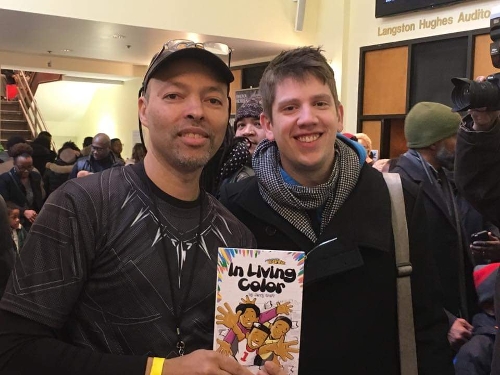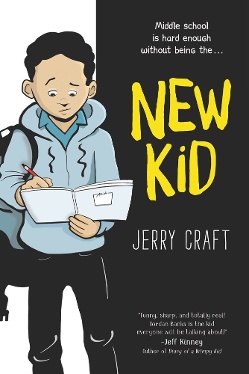Profile of 2020 Coretta Scott King Book Award Author and Newbery Medal winner Jerry Craft
For Jerry Craft, books are the building blocks of communities.Certainly, in the year since it was published, his graphic novel New Kid has created and strengthened countless communities all on its own. The letters from teachers who say they’ve made the book aschool-wide read — and the letters from students who say the book is what they needed to finally start a conversation about racism and prejudice with their classmates — are proof of that.
For Jerry Craft, books are the building blocks of communities.
Certainly, in the year since it was published, his graphic novel New Kid has created and strengthened countless communities all on its own. The letters from teachers who say they’ve made the book a school-wide read — and the letters from students who say the book is what they needed to finally start a conversation about racism and prejudice with their classmates — are proof of that.
But even before Jerry’s protagonist Jordan Banks made his way into the world, I’d already seen this knack Jerry has for bringing people together with books.
In January 2017, three months after I’d acquired New Kid and started working with Jerry, he invited me up to the Schomburg Center in Harlem for the annual Black Comic Book Festival (BCBF). Jerry is one of the festival’s co-founders, and he promised me a day filled with cosplayers, authors, artists, and kid readers. Not only that, I’d get to meet his sons, Jay and Aren, who would be helping out at their dad’s table. (I’d heard so many great things about Jerry’s sons in three short months; Jerry is the proud father par excellence.)

Jerry Craft and Andrew Eliopulos at the Black Comic Book Festival. Photo: Jay Craft.
After years of attending comic cons at the Javits Center, I thought I knew what I was in for with the BCBF. But, reader, let me tell you, that festival had an energy. It was a joyous energy — and the currents in the sea of people were visibly flowing around Jerry’s table. At first, I assumed this meant that everyone knew Jerry. A result of his being co-founder, perhaps. But after I said hello and spent a few minutes at the table, I realized the truth. Jerry didn’t know all these cape-wearing comic fans (some young and some just young at heart), but he could greet and get to know a person in under a minute — and in the next minute, he could forge a genuine connection with his would-be readers that had them eager to check out the books at his table. Books like Mama’s Boyz: In Living Color, based on Jerry’s syndicated Mama’s Boyz comic strip, which depicted a Black family’s everyday life with humor and warmth. Or like The Offenders: Saving the World While Serving Detention, an anti-bullying superhero story that Jerry had written with his sons.
I could see kids’ eyes lighting up when they flipped through the pages of Jerry’s books. That sense of connection Jerry creates in person practically radiates off his expressive, inviting, and funny illustrations.
He makes it look so effortless, somehow. And he has such a quick wit; it would be easy to assume that the humor that so disarms Jerry’s readers is a natural extension of Jerry’s own winking charm. (I once heard him respond to a teacher who said, “It’s nice to see you in person” with “Thank you, it’s nice to be in person,” without missing a beat.)
 But now that I’ve gotten to see his process over two books — New Kid and its forthcoming sequel, Class Act — I can tell you that the old adage is true: it takes a lot of hard work to make a book so easy to read. Jerry often describes his creative process for his books in terms of “layering.” He begins with the bones of a story, sketches it out as a dummy, and then goes back to the beginning to layer in more jokes. When he’s finished doing that, he goes back to the beginning and does it all again. And it’s not just jokes Jerry weaves in during these rounds of revision. Long after the arc of Jordan Banks’s school year was in place, Jerry drew out moments of connection and resonance — as on the very last page of the book, where Jordan’s old neighborhood friends school him on the difference between a metaphor and a simile.
But now that I’ve gotten to see his process over two books — New Kid and its forthcoming sequel, Class Act — I can tell you that the old adage is true: it takes a lot of hard work to make a book so easy to read. Jerry often describes his creative process for his books in terms of “layering.” He begins with the bones of a story, sketches it out as a dummy, and then goes back to the beginning to layer in more jokes. When he’s finished doing that, he goes back to the beginning and does it all again. And it’s not just jokes Jerry weaves in during these rounds of revision. Long after the arc of Jordan Banks’s school year was in place, Jerry drew out moments of connection and resonance — as on the very last page of the book, where Jordan’s old neighborhood friends school him on the difference between a metaphor and a simile.
With each round of layering, Jerry also works in more people. Jordan Banks’s story at Riverdale Academy Day School is based on Jerry’s own experiences growing up in Washington Heights and attending a renowned private school, together with the experiences of his sons, who attended private schools as well. So from day one, page one, New Kid has always been a book that contains many years and lives. But imagine my surprise when the second draft of the book came in, suddenly with references to a St. Harwell’s school (my birth name), a Headmaster Hansen (named for Jerry’s literary agent, Judy Hansen), and a teacher Ms. Brosnan (named after Quill Tree Books’s editorial director Rosemary Brosnan).
Again: with books, in layers, Jerry builds communities.
Perhaps Jerry works so deliberately to bring people together in his books because, for so long, he did not feel welcomed by the books he encountered. In “My Life in Comics,” a short bio comic at the end of Mama’s Boyz: In Living Color, Jerry poignantly illustrates how, as a kid, he went from drawing superhero comics for his brother’s entertainment to realizing that the disparity between how Black and white superheroes were depicted in comics and movies made it hard to find them entertaining after all. After graduating from the School of Visual Arts, Jerry sought to address some of the disparity himself, embarking on a career in cartooning, but it was tough to break into a comics industry that did not see a market for work like his.
Now, of course, the comics industry has changed. With creators like Raina Telgemeier, Cece Bell, Victoria Jamieson, Gene Luen Yang, and more having paved the way for children’s graphic novels to enjoy both critical and commercial success, Jerry’s New Kid arrived at just the right time to reach a lot of readers who hadn’t seen themselves yet on this burgeoning bookshelf. New Kid was an overnight success, a few decades in the making.
In the sequel Class Act, Jerry is celebrating this golden age in children’s comics with another act of book as community. Where the chapter-opener spreads in book one lampooned well-known titles from pop culture, most of the chapter openers in book two feature friendly riffs on children’s and teen graphic novels you may have read. The quickness with which the creators of these books gave their blessings to these pages is itself a testament to the community of cartoonists who have been signing, tabling, and paneling together for years — lifting one another up in a way that made Jerry’s historic Newbery win (a first for a graphic novel) feel like a win for the whole industry.
Even as I’m writing this profile of Jerry, in the world outside the coronavirus pandemic has reached frightening heights. The ALA Annual Conference has been cancelled for the first time since World War II and, with it, the chance to celebrate as a community everything that these awards represent, at least “in person” — at least for now.
But what I have learned from getting to work with Jerry these past few years is that the books are the community. That while we will never again take for granted how rejuvenating it can be to be together, in person, when we have books that contain many years and many lives, we are already together — connected, even united.
The dedication in New Kid as it currently reads was one of the last lines of text in the book to be finalized. It was a layer Jerry added, during one of his many rounds. It reads: “To the Jordan Banks in all of us.” That’s an ambitiously vast community, all of us. But if anyone can reach it, and bring it together, I believe Jerry can.
 Andrew Eliopulos is an executive editor at Quill Tree Books, an imprint of HarperCollins Children’s Books. From the July/August 2020 issue of The Horn Book Magazine: Special Issue: ALA Awards. Read Jerry Craft's Newbery and CSK Author Award speeches for New Kid. For more speeches, profiles, and articles, click the tag ALA 2020.
Andrew Eliopulos is an executive editor at Quill Tree Books, an imprint of HarperCollins Children’s Books. From the July/August 2020 issue of The Horn Book Magazine: Special Issue: ALA Awards. Read Jerry Craft's Newbery and CSK Author Award speeches for New Kid. For more speeches, profiles, and articles, click the tag ALA 2020.
Single copies of this special issue are available for $15.00 including postage and may be ordered from:
Kristy South
Administrative Coordinator, The Horn Book
Phone 888-282-5852 | Fax 614-733-7269
ksouth@juniorlibraryguild.com

RELATED
ALREADY A SUBSCRIBER? LOG IN
We are currently offering this content for free. Sign up now to activate your personal profile, where you can save articles for future viewing.







Add Comment :-
Be the first reader to comment.
Comment Policy:
Comment should not be empty !!!